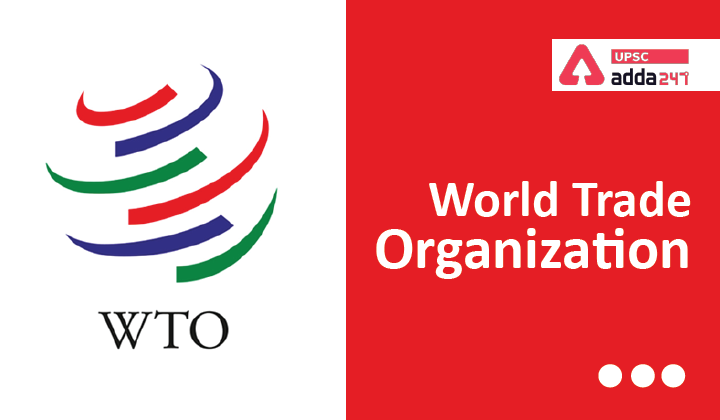Table of Contents
WTO: Relevance
- GS 2: Important International institutions, agencies and fora – their structure, mandate.
What is the WTO?
- The World Trade Organization (WTO) is the only global international organization dealing with the rules of trade between nations.
- Its main function is to ensure that trade flows as smoothly, predictably and freely as possible.
- WTO is not a United Nations specialized agency and it is not part of the United Nations system, but has cooperative arrangements and practices with the United Nations.
- The WTO has over 160 members representing 98 per cent of world trade.
History of WTO
- From 1948 to 1994, the GATT (General Agreement on Tariffs and Trade) provided the rules for world trade.
- It seemed well-established but throughout those 47 years, it was a provisional agreement and organization.
- The WTO’s creation in 1995 marked the biggest reform of international trade since the end of the Second World War.
- Whereas the GATT mainly dealt with trade in goods, the WTO and its agreements also cover trade in services and intellectual property.
- The birth of the WTO also created new procedures for the settlement of disputes.
WTO functions
- WTO operates a global system of trade rules.
- WTO acts as a forum for negotiating trade agreements.
- WTO settles trade disputes between its members and
- WTO supports the needs of developing countries.
WTO Decision-making
- The WTO’s top decision-making body is the Ministerial Conference. Below this is the General Council and various other councils and committees.
- Ministerial conferences usually take place every two years.
- The General Council is the top day-to-day decision-making body. It meets a number of times a year in Geneva.
Director-General of the WTO
- Ngozi Okonjo-Iweala is the seventh Director-General of the WTO. She took office on 1 March 2021.
- She is the first woman and the first African to serve as Director-General. Her term of office will expire on 31 August 2025.
WTO Principles
Below two principles are the foundation of the multilateral trading system.
Most-favoured-nation (MFN)
- It means treating other people equally.
- Under the WTO agreements, countries cannot normally discriminate between their trading partners.
- If a country grants some country a special favour (such as a lower customs duty rate for one of their products), it has to do the same for all other WTO members.
- Exceptions:
- if a country has Free Trade Agreement with some country;
- if a country is giving developing countries special access to their markets;
- if a country has raised barriers against products that are considered to be traded unfairly from specific countries.
National treatment
- It means treating foreigners and locals equally.
- Imported and locally-produced goods should be treated equally — at least after the foreign goods have entered the market.
- The same should apply to foreign and domestic services, and to foreign and local trademarks, copyrights and patents.
- National treatment only applies once a product, service or item of intellectual property has entered the market. Therefore, charging customs duty on an import is not a violation of national treatment even if locally-produced products are not charged an equivalent tax.
WTO dispute settlement
- WTO also deals in Dispute Settlements.
- One contravention of WTO agreements, a member country approaches the WTO’s dispute settlement body.
- All the members are encouraged to settle the disputes through consultation or through a panel, if the consultation fails.
- The WTO panel circulates the verdict of the dispute settlement amongst WTO members who can decide to either accept or reject the ruling.
- If the ruling is approved, the member country that violated the rules must change rules in line with the WTO Agreement.
- In the case of failure to do so, the complaining country and the violating country may determine a mutually-acceptable compensation, failing which, the complaining country may retaliate suitably.
WTO settlement bodies
- The General Council convenes as the Dispute Settlement Body (DSB) to deal with disputes between WTO members.
- Appeals are handled by the permanent seven-member Appellate Body which is set up by the Dispute Settlement Body and broadly represents the range of WTO membership.
Also Read:





 TSPSC Group 1 Question Paper 2024, Downl...
TSPSC Group 1 Question Paper 2024, Downl...
 TSPSC Group 1 Answer key 2024 Out, Downl...
TSPSC Group 1 Answer key 2024 Out, Downl...
 UPSC Prelims 2024 Question Paper, Downlo...
UPSC Prelims 2024 Question Paper, Downlo...





